| I. The Israeli Connection
A few blocks off Pennsylvania Avenue, the FBI's eight-story Washington
field office exudes all the charm of a maximum-security prison. Its curved
roof is made of thick stainless steel, the bottom three floors are wrapped
in granite and limestone, hydraulic bollards protect the ramp to the
four-floor garage, and bulletproof security booths guard the entrance to
the narrow lobby. On the fourth floor, like a tomb within a tomb, lies the
most secret room in the $100 million concrete fortress—out-of-bounds
even for special agents without an escort. Here, in the Language Services
Section, hundreds of linguists in padded earphones sit elbow-to-elbow in
long rows, tapping computer keyboards as they eavesdrop on the phone lines
of foreign embassies and other high-priority targets in the nation's
capital.
At the far end of that room, on the morning of February 12th, 2003, a
small group of eavesdroppers were listening intently for evidence of a
treacherous crime. At the very moment that American forces were massing
for an invasion of Iraq, there were indications that a rogue group of
senior Pentagon officials were already conspiring to push the United
States into another war—this time with Iran.
A few miles away, FBI agents watched as Larry Franklin, an Iran expert
and career employee of the Defense Intelligence Agency, drove up to the
Ritz-Carlton hotel across the Potomac from Washington. A trim man of
fifty-six, with a tangle of blond hair speckled gray, Franklin had left
his modest home in Kearneysville, West Virginia, shortly before dawn that
morning to make the eighty-mile commute to his job at the Pentagon. Since
2002, he had been working in the Office of Special Plans, a crowded warren
of blue cubicles on the building's fifth floor. A secretive unit
responsible for long-term planning and propaganda for the invasion of
Iraq, the office's staffers referred to themselves as "the
cabal." They reported to Douglas Feith, the third-most-powerful
official in the Defense Department, helping to concoct the fraudulent
intelligence reports that were driving America to war in Iraq.
Just two weeks before, in his State of the Union address, President
Bush had begun laying the groundwork for the invasion, falsely claiming
that Saddam Hussein had the means to produce tens of thousands of
biological and chemical weapons, including anthrax, botulinum toxin, sarin,
mustard and VX nerve agent. But an attack on Iraq would require something
that alarmed Franklin and other neoconservatives almost as much as weapons
of mass destruction: detente with Iran. As political columnist David
Broder reported in The Washington Post, moderates in the Bush
administration were "covertly negotiating for Iran to stay quiet and
offer help to refugees when we go into Iraq."
Franklin—a devout neoconservative who had been brought into Feith's
office because of his political beliefs—was hoping to undermine those
talks. As FBI agents looked on, Franklin entered the restaurant at the
Ritz and joined two other Americans who were also looking for ways to push
the U.S. into a war with Iran. One was Steven Rosen, one of the most
influential lobbyists in Washington. Sixty years old and nearly bald, with
dark eyebrows and a seemingly permanent frown, Rosen was director of
foreign-policy issues at Israel's powerful lobby, the American Israel
Public Affairs Committee. Seated next to Rosen was AIPAC's Iran expert,
Keith Weissman. He and Rosen had been working together closely for a
decade to pressure U.S. officials and members of Congress to turn up the
heat on Tehran.
Over breakfast at the Ritz-Carlton, Franklin told the two lobbyists
about a draft of a top-secret National Security Presidential Directive
that dealt with U.S. policy on Iran. Crafted by Michael Rubin, the desk
officer for Iraq and Iran in Feith's office, the document called, in
essence, for regime change in Iran. In the Pentagon's view, according to
one senior official there at the time, Iran was nothing but "a house
of cards ready to be pushed over the precipice." So far, though, the
White House had rejected the Pentagon's plan, favoring the State
Department's more moderate position of diplomacy. Now, unwilling to play
by the rules any longer, Franklin was taking the extraordinary—and
illegal—step of passing on highly classified information to lobbyists
for a foreign state. Unable to win the internal battle over Iran being
waged within the administration, a member of Feith's secret unit in the
Pentagon was effectively resorting to treason, recruiting AIPAC to use its
enormous influence to pressure the president into adopting the draft
directive and wage war against Iran.
It was a role that AIPAC was eager to play. Rosen, recognizing that
Franklin could serve as a useful spy, immediately began plotting ways to
plant him in the White House—specifically in the National Security
Council, the epicenter of intelligence and national-security policy. By
working there, Rosen told Franklin a few days later, he would be "by
the elbow of the president."
Knowing that such a maneuver was well within AIPAC's capabilities,
Franklin asked Rosen to "put in a good word" for him. Rosen
agreed. "I'll do what I can," he said, adding that the breakfast
meeting had been a real "eye-opener."
Working together, the two men hoped to sell the United States on yet
another bloody war. A few miles away, digital recorders at the FBI's
Language Services Section captured every word.
II. The Guru and the Exile
In recent weeks, the attacks by Hezbollah on Israel have given
neoconservatives in the Bush administration the pretext they were seeking
to launch what former House Speaker Newt Gingrich calls "World War
III." Denouncing the bombings as "Iran's proxy war,"
William Kristol of The Weekly Standard is urging the Pentagon to counter
"this act of Iranian aggression with a military strike against
Iranian nuclear facilities." According to Joseph Cirincione, an arms
expert and the author of Deadly Arsenals: Nuclear, Biological and Chemical
Threats, "The neoconservatives are now hoping to use the
Israeli-Lebanon conflict as the trigger to launch a U.S. war against
Syria, Iran or both."
But the Bush administration's hostility toward Iran is not simply an
outgrowth of the current crisis. War with Iran has been in the works for
the past five years, shaped in almost complete secrecy by a small group of
senior Pentagon officials attached to the Office of Special Plans. The man
who created the OSP was Douglas Feith, the undersecretary of defense for
policy. A former Middle East specialist on the National Security Council
in the Reagan administration, Feith had long urged Israel to secure its
borders in the Middle East by attacking Iraq and Iran. After Bush's
election, Feith went to work to make that vision a reality, putting
together a team of neoconservative hawks determined to drive the U.S. to
attack Tehran. Before Bush had been in office a year, Feith's team had
arranged a covert meeting in Rome with a group of Iranians to discuss
their clandestine help.
The meeting was arranged by Michael Ledeen, a member of the cabal
brought aboard by Feith because of his connections in Iran. Described by
The Jerusalem Post as "Washington's neoconservative guru,"
Ledeen grew up in California during the 1940s. His father designed the
air-conditioning system for Walt Disney Studios, and Ledeen spent much of
his early life surrounded by a world of fantasy. "All through my
childhood we were an adjunct of the Disney universe," he once
recalled. "According to family legend, my mother was the model for
Snow White, and we have a picture of her that does indeed look just like
the movie character."
In 1977, after earning a Ph.D. in history and philosophy and teaching
in Rome for two years, Ledeen became the first executive director of the
Jewish Institute for National Security Affairs, a pro-Israel pressure
group that served as a flagship of the neoconservative movement. A few
years later, after Reagan was elected, Ledeen had become prominent enough
to earn a spot as a consultant to the National Security Council alongside
Feith. There he played a central role in the worst scandal of Reagan's
presidency: the covert deal to provide arms to Iran in exchange for
American hostages being held in Lebanon. Ledeen served as the
administration's intermediary with Israel in the illegal-arms deal. In
1985, he met with Manucher Ghorbanifar, a one-time Iranian carpet salesman
who was widely believed to be an Israeli agent. The CIA considered
Ghorbanifar a dangerous con man and had issued a "burn notice"
recommending that no U.S. agency have any dealings with him. Unfazed,
Ledeen called Ghorbanifar "one of the most honest, educated,
honorable men I have ever known." The two men brokered the arms
exchange—a transaction that would result in the indictment of fourteen
senior officials in the Reagan administration.
"It was awful—you know, bad things happened," Ledeen says
now. "When Iran-Contra was over, I said, ?Boy, I'm never going to
touch Iran again.' "
But in 2001, soon after he arrived at the Pentagon, Ledeen once again
met with Ghorbanifar. This time, instead of selling missiles to the
Iranian regime, the two men were exploring how best to topple it.
"The meeting in Rome came about because my friend Manucher
Ghorbanifar called me up," Ledeen says. Stout and balding, with a
scruffy white beard, Ledeen is sitting in the living room of his
white-brick home in Chevy Chase, Maryland, smoking a Dominican cigar. His
Airedale terrier, Thurber, roams the room protectively. In his first
extensive interview about the covert Pentagon operation, Ledeen makes no
secret of his desire to topple the government in Tehran. "I want to
bring down the regime," he says. "I want the regime gone. It's a
country that is fanatically devoted to our destruction."
When Ghorbanifar called Ledeen in the fall of 2001, he claimed, as he
often does, to have explosive intelligence that was vital to U.S.
interests. "There are Iranians who have firsthand information about
Iranian plans to kill Americans in Afghanistan," he told Ledeen.
"Does anyone want to hear about it?"
Ledeen took the information to Stephen Hadley, the deputy national
security adviser at the White House. "I know you're going to throw me
out of the office," Ledeen told him, "and if I were you I would
throw me out of the office too. But I promised that I would give you this
option. Ghorbanifar has called me. He said these people are willing to
come. Do you want anybody to go and talk to them?"
Hadley was interested. So was Zalmay Khalilzad, then the point man on
Near East issues for the National Security Council and now the U.S.
ambassador to Baghdad. "I think we have to do this, we have to hear
this," Hadley said. Ledeen had the green light: As he puts it,
"Every element of the American government knew this was going to
happen in advance."
III. The Meeting in Rome
Weeks later, in December, a plane carrying Ledeen traveled to Rome with
two other members of Feith's secret Pentagon unit: Larry Franklin and
Harold Rhode, a protégé of Ledeen who has been called the
"theoretician of the neocon movement." A specialist on Islam who
speaks Hebrew, Arabic, Turkish and Farsi, Rhode had experience with shady
exiles like Ghorbanifar: He was close to Ahmed Chalabi, the Iraqi
dissident whose discredited intelligence helped drive the Bush
administration to invade Baghdad. According to UPI, Rhode himself was
later observed by CIA operatives passing "mind-boggling"
intelligence to Israel, including sensitive information about U.S.
military deployments in Iraq.
Completing the rogues' gallery that assembled in Rome that day was the
man who helped Ledeen arrange the meeting: Nicolò Pollari, the director
of Italy's military intelligence. Only two months earlier, Pollari had
informed the Bush administration that Saddam Hussein had obtained uranium
from West Africa—a key piece of false intelligence that Bush used to
justify the invasion of Iraq.
To hide the shadowy rendezvous in Rome, Pollari provided a
well-protected safe house near the noisy espresso bars and busy trattorias
that surround the Piazza di Spagna in central Rome. "It was in a
private apartment," Ledeen recalls. "It was fucking freezing—it
was unheated." The Pentagon operatives and the men from Iran sat at a
dining-room table strewn with demitasse cups of blackish coffee, ashtrays
littered with crushed cigarette butts and detailed maps of Iran, Iraq and
Syria. "They gave us information about the location and plans of
Iranian terrorists who were going to kill Americans," Ledeen says.
Ledeen insists the intelligence was on the mark. "It was
true," he says. "The information was accurate." Not
according to his boss. "There wasn't anything there that was of
substance or of value that needed to be pursued further," Defense
Secretary Donald Rumsfeld later conceded. "It went nowhere."
The men then turned their attention to their larger goal: regime change
in Iran. Ghorbanifar suggested funding the overthrow of the Iranian
government using hundreds of millions of dollars in cash supposedly hidden
by Saddam Hussein. He even hinted that Saddam was hiding in Iran.
Ledeen, Franklin and Rhode were taking a page from Feith's playbook on
Iraq: They needed a front group of exiles and dissidents to call for the
overthrow of Iran. According to sources familiar with the meeting, the
Americans discussed joining forces with the Mujahedin-e Khalq, an
anti-Iranian guerrilla army operating out of Iraq.
There was only one small problem: The MEK had been certified by the
State Department as a terrorist organization. In fact, the White House was
in the midst of negotiations with Tehran, which was offering to extradite
five members of Al Qaeda thought to be of high intelligence value in
return for Washington's promise to drop all support for the MEK.
Ledeen denies any dealings with the group. "I wouldn't get within
a hundred miles of the MEK," he says. "They have no following,
no legitimacy." But neoconservatives were eager to undermine any deal
that involved cooperating with Iran. To the neocons, the value of the MEK
as a weapon against Tehran greatly outweighed any benefit that might be
derived from interrogating the Al Qaeda operatives—even though they
might provide intelligence on future terrorist attacks, as well as clues
to the whereabouts of Osama bin Laden.
Ledeen and his Pentagon cabal were not the only American officials to
whom Ghorbanifar tried to funnel false intelligence on Iran. Last year,
Rep. Curt Weldon, a Republican from Pennsylvania, claimed he had
intelligence—from an "impeccable clandestine source" he
code-named "Ali"—that the Iranian government was plotting to
launch attacks against the United States. But when the CIA investigated
the allegations, it turned out that Ali was Fereidoun Mahdavi, an Iranian
exile who was serving as a frontman for Ghorbanifar and trying to shake
down the CIA for $150,000. "He is a fabricator," said Bill
Murray, the former CIA station chief in Paris. Weldon was furious: The
agency had dismissed Ali, he insisted, "because they want to avoid,
at all costs, drawing the United States into a war with Iran."
After the Rome rendezvous, Ledeen and Ghorbanifar continued to meet
several times a year, often for a day or two at a time. Rhode also met
with Ghorbanifar in Paris, and the Iranian phoned or faxed his Pentagon
contacts almost every day. At one point Ledeen notified the Pentagon that
Ghorbanifar knew of highly enriched uranium being moved from Iraq to Iran.
At another point, in 2003, he claimed that Tehran was only a few months
away from exploding a nuclear bomb—even though international experts
estimate that Iran is years away from developing nuclear weapons. But the
accuracy of the reports wasn't important—what mattered was their value
in drumming up support for war. It was Iraq all over again.
IV. On the Trail of Mr. X
Such covert efforts by Feith's team in the Pentagon started to have the
desired effect. In November 2003, Rumsfeld approved a plan known as
CONPLAN 8022-02, which for the first time established a pre-emptive-strike
capability against Iran. That was followed in 2004 by a top-secret
"Interim Global Strike Alert Order" that put the military on a
state of readiness to launch an airborne and missile attack against Iran,
should Bush issue the command. "We're now at the point where we are
essentially on alert," said Lt. Gen. Bruce Carlson, commander of the
8th Air Force. "We have the capacity to plan and execute global
strikes in half a day or less."
But as the Pentagon moved the country closer to war with Iran, the FBI
was expanding its investigation of AIPAC and its role in the plot. David
Szady, then the bureau's top spy-catcher, had become convinced that at
least one American citizen working inside the U.S. government was spying
for Israel. "It's no longer just our traditional adversaries who want
to steal our secrets, but sometimes even our allies," Szady declared.
"The threat is incredibly serious." To locate the spy sometimes
referred to as Mr. X, agents working for Szady began focusing on a small
group of neoconservatives in the Pentagon—including Feith, Ledeen and
Rhode.
The FBI also had its sights on Larry Franklin, who continued to hold
clandestine meetings with Rosen at AIPAC. Apparently nervous that the FBI
might be on to them, the two men started taking precautions. On March
10th, 2003, barely a week before the invasion of Iraq, Rosen met Franklin
in Washington's cavernous Union Station. The pair met at one restaurant,
then they hustled to another, and finally they ended up in a third—this
one totally empty. As an added precaution, Franklin also began sending
faxes to Rosen's home instead of to his AIPAC offices.
A few days later, Rosen and Weissman passed on to Israeli-embassy
officials details about the draft of the top-secret presidential directive
on Iran, saying they had received the document from a "friend of ours
in the Pentagon." They also relayed to the Israelis details about
internal Bush-administration discussions on Iran. Then, two days before
the U.S. invasion of Iraq, Rosen leaked the information to the press with
the comment "I'm not supposed to know this." The Washington Post
eventually published the story under the headline "Pressure Builds
for President to Declare Strategy on Iran," crediting the classified
information to "well-placed sources." The story mentioned Ledeen,
who helped found the Coalition for Democracy in Iran, a pressure group
dedicated to the overthrow of the Iranian government, but gave no
indication that the leak had come from someone with a definite agenda for
planting the information.
That June, Weissman called Franklin and left a message that he and
Rosen wanted to meet with him again and talk about "our favorite
country." The meeting took place in the Tivoli Restaurant, a dimly
lit establishment two floors above the metro station in Arlington that was
frequently used by intelligence types for quiet rendezvous. Over lunch in
the mirrored dining room, the three men discussed the Post article, and
Rosen acknowledged "the constraints" Franklin was under to meet
with them. But the Pentagon official placed himself fully at AIPAC's
disposal. "You set the agenda," Franklin told Rosen.
In addition to meeting Rosen and Weissman, Franklin was also getting
together regularly with Naor Gilon, an Israeli embassy official who,
according to a senior U.S. counterintelligence official, "showed
every sign of being an intelligence agent." Franklin and Gilon would
normally meet amid the weight machines and punching bags at the Pentagon
Officers Athletic Club, where Franklin passed along secret information
regarding Iran's activities in Iraq, its missile-testing program and even,
apparently, New York Times reporter Judith Miller. At one point, Gilon
suggested that Franklin meet with Uzi Arad, Mossad's former director of
intelligence and former Prime Minister Benjamin Netanyahu's foreign-policy
adviser. A week later, Franklin had lunch in the Pentagon cafeteria with
the former top Israeli spy.
V. Iran's Double Agent
Larry Franklin, it turns out, wasn't the only person involved in the
Pentagon's covert operation who was exchanging state secrets with other
governments. As the FBI monitored Franklin and his clandestine dealings
with AIPAC, it was also investigating another explosive case of espionage
linked to Feith's office and Iran. This one focused on Ahmed Chalabi, the
head of the Iraqi National Congress, the militant anti-Saddam opposition
group that had worked for more than a decade to pressure the U.S. into
invading Iraq.
For years, the National Security Agency had possessed the codes used by
Iran to encrypt its diplomatic messages, enabling the U.S. government to
eavesdrop on virtually every communication between Tehran and its
embassies. After the U.S. invaded Baghdad, the NSA used the codes to
listen in on details of Iran's covert operations inside Iraq. But in 2004,
the agency intercepted a series of urgent messages from the Iranian
embassy in Baghdad. Intelligence officials at the embassy had discovered
the massive security breach—tipped off by someone familiar with the U.S.
code-breaking operation.
The blow to intelligence-gathering could not have come at a worse time.
The Bush administration suspected that the Shiite government in Iran was
aiding Shiite insurgents in Iraq, who were killing U.S. soldiers. The
administration was also worried that Tehran was secretly developing
nuclear weapons. Now, crucial intelligence that might have shed light on
those operations had been cut off, potentially endangering American lives.
On May 20th, shortly after the discovery of the leak, Iraqi police
backed by American soldiers raided Chalabi's home and offices in Baghdad.
The FBI suspected that Chalabi, a Shiite who had a luxurious villa in
Tehran and was close to senior Iranian officials, was actually working as
a spy for the Shiite government of Iran. Getting the U.S. to invade Iraq
was apparently part of a plan to install a pro-Iranian Shiite government
in Baghdad, with Chalabi in charge. The bureau also suspected that
Chalabi's intelligence chief had furnished Iran with highly classified
information on U.S. troop movements, top-secret communications, plans of
the provisional government and other closely guarded material on U.S.
operations in Iraq. On the night of the raid, The CBS Evening News carried
an exclusive report by correspondent Lesley Stahl that the U.S. government
had "rock-solid" evidence that Chalabi had been passing
extremely sensitive intelligence to Iran—evidence so sensitive that it
could "get Americans killed."
The revelation shocked Franklin and other members of Feith's office. If
true, the allegations meant that they had just launched a war to put into
power an agent of their mortal enemy, Iran. Their man—the dissident
leader who sat behind the first lady in the president's box during the
State of the Union address in which Bush prepared the country for war—appeared
to have been working for Iran all along.
Franklin needed to control the damage, and fast. He was one of the very
few in the government who knew that it was the NSA code-breaking
information that Chalabi was suspected of passing to Iran, and that there
was absolute proof that Chalabi had met with a covert Iranian agent
involved in operations against the U.S. To protect those in the Pentagon
working for regime change in Tehran, Franklin needed to get out a simple
message: We didn't know about Chalabi's secret dealings with Iran.
Franklin decided to leak the information to a friendly contact in the
media: Adam Ciralsky, a CBS producer who had been fired from the CIA,
allegedly for his close ties to Israel. On May 21st, the day after CBS
broadcast its exclusive report on Chalabi, Franklin phoned Ciralsky and
fed him the information. As the two men talked, eavesdroppers at the FBI's
Washington field office recorded the conversation.
That night, Stahl followed up her original report with "new
details"—the information leaked earlier that day by Franklin. She
began, however, by making clear that she would not divulge the most
explosive detail of all: the fact that Chalabi had wrecked the NSA's
ability to eavesdrop on Iran. "Senior intelligence officials were
stressing today that the information Ahmed Chalabi is alleged to have
passed on to Iran is so seriously sensitive that the result of full
disclosure would be highly damaging to U.S. security," Stahl said.
"Because of that, we are not reporting the details of what exactly
Chalabi is said to have compromised, at the request of U.S. officials at
the highest levels. The information involves secrets that were held by
only a handful of very senior intelligence officials." Thanks to the
pressure from the administration, the public was prevented from learning
the most damaging aspect of Chalabi's treachery.
Then Stahl moved on to Franklin's central message.
"Meanwhile," she said, "we have been told that grave
concerns about the true nature of Chalabi's relationship with Iran started
after the U.S. obtained, quote, ?undeniable intelligence' that Chalabi met
with a senior Iranian intelligence officer, a, quote, ?nefarious figure
from the dark side of the regime, an individual with a direct hand in
covert operations against the United States.' Chalabi never reported this
meeting to anyone in the U.S. government, including his friends and
sponsors." In short, the Pentagon—and Feith's office in particular—was
blameless.
VI. The Cabal's Triumph
Soon after the broadcast, David Szady's team at the FBI decided to wrap
up its investigation before Franklin leaked any more information. Agents
quietly confronted Franklin with the taped phone call and pressured him to
cooperate in a sting operation directed at AIPAC and members of Feith's
team in the Pentagon. Franklin, facing a long prison sentence, agreed. On
August 4th, 2005, Rosen and Weissman were indicted, and on January 20th,
2006, Franklin, who had earlier pleaded guilty, was sentenced to twelve
years and seven months in prison. In an attempt to reduce his sentence, he
agreed to testify against the former AIPAC officials. The case is set to
go to trial this fall.
So far, however, Franklin is the only member of Feith's team to face
charges. The continuing lack of indictments demonstrates how frighteningly
easy it is for a small group of government officials to join forces with
agents of foreign powers—whether it is AIPAC or the MEK or the INC—to
sell the country on a disastrous war.
The most glaring unindicted co-conspirator is Ahmed Chalabi. Even
top-ranking Republicans suspect him of double dealing: "I wouldn't be
surprised if he told Iranians facts, issues, whatever, that we did not
want them to know," said Rep. Chris Shays, R-Conn., who chairs the
House subcommittee on national security. Yet the FBI has been unable to so
much as question Chalabi as part of its ongoing espionage case. Last
November, when Chalabi returned to the United States for a series of
speeches and media events, the FBI tried to interview him. But because he
was under State Department protection during his visit, sources in the
Justice Department say, the bureau's request was flatly denied.
"Chalabi's running around saying, ?I have nothing to hide,' "
says one senior FBI official. "Yet he's using our State Department to
keep us from him at the same time. And we've got to keep our mouth
shut."
In the end, the work of Franklin and the other members of Feith's
secret office had the desired effect. Working behind the scenes, the
members of the Office of Special Plans succeeded in setting the United
States on the path to all-out war with Iran. Indeed, since Bush was
re-elected to a second term, he has made no secret of his desire to see
Tehran fall. In a victory speech of sorts on Inauguration Day in January
2005, Vice President Dick Cheney warned bluntly that Iran was "right
at the top" of the administration's list of "trouble spots"—and
that Israel "might well decide to act first" by attacking Iran.
The Israelis, Cheney added in an obvious swipe at moderates in the State
Department, would "let the rest of the world worry about cleaning up
the diplomatic mess afterward."
Over the past six months, the administration has adopted almost all of
the hard-line stance advocated by the war cabal in the Pentagon. In May,
Bush's ambassador to the United Nations, John Bolton, appeared before
AIPAC's annual conference and warned that Iran "must be made aware
that if it continues down the path of international isolation, there will
be tangible and painful consequences." To back up the tough talk, the
State Department is spending $66 million to promote political change
inside Iran—funding the same kind of dissident groups that helped drive
the U.S. to war in Iraq. "We may face no greater challenge from a
single country than from Iran," Secretary of State Condoleezza Rice
declared.
In addition, the State Department recently beefed up its Iran Desk from
two people to ten, hired more Farsi speakers and set up eight intelligence
units in foreign countries to focus on Iran. The administration's National
Security Strategy—the official policy document that sets out U.S.
strategic priorities—now calls Iran the "single country" that
most threatens U.S. interests.
The shift in official policy has thrilled former members of the cabal.
To them, the war in Lebanon represents the final step in their plan to
turn Iran into the next Iraq. Ledeen, writing in the National Review on
July 13th, could hardly restrain himself. "Faster, please," he
urged the White House, arguing that the war should now be taken over by
the U.S. military and expanded across the entire region. "The only
way we are going to win this war is to bring down those regimes in Tehran
and Damascus, and they are not going to fall as a result of fighting
between their terrorist proxies in Gaza and Lebanon on the one hand, and
Israel on the other. Only the United States can accomplish it," he
concluded. "There is no other way." http://www.rollingstone.com/politics/story/10962352/iran_the_next_war/1
|

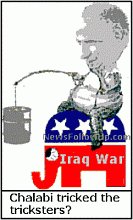



 Matalin
Matalin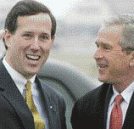 Santorum, who will be fighting for his seat
in November, uses the phrase repeatedly. “Islamic fascism,” he told the
National Press Club in July “is the great test of this generation.” In
June, political consultant Mary
Santorum, who will be fighting for his seat
in November, uses the phrase repeatedly. “Islamic fascism,” he told the
National Press Club in July “is the great test of this generation.” In
June, political consultant Mary 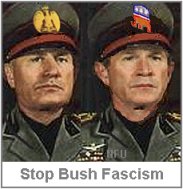
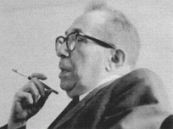 Leo
Strauss ..."was a German-born American
political philosopher, who specialized in the study of classical
philosophy ... Since his death, he has come to be regarded, although
debatably, as a leading intellectual source of neoconservatism in the
United States. Strauss has been interpreted as endorsing "noble
lies;" myths used by political leaders seeking to maintain a cohesive
society"
Leo
Strauss ..."was a German-born American
political philosopher, who specialized in the study of classical
philosophy ... Since his death, he has come to be regarded, although
debatably, as a leading intellectual source of neoconservatism in the
United States. Strauss has been interpreted as endorsing "noble
lies;" myths used by political leaders seeking to maintain a cohesive
society" 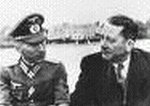 Carl
Schmitt, right, internet search terms: leading Nazi philosopher of law,
Leo Strauss, absolute rulers who lied deceived and manipulated the foolish
masses, used religion to perpetuate myths,...etc.
Carl
Schmitt, right, internet search terms: leading Nazi philosopher of law,
Leo Strauss, absolute rulers who lied deceived and manipulated the foolish
masses, used religion to perpetuate myths,...etc. 




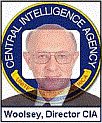

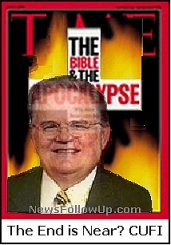
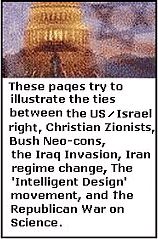
 and
also see GOP dirty tricks page
and
also see GOP dirty tricks page
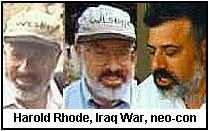 search internet: Harold Rhode, Ledeen, Woolsey, Chalabi, Iraqi National
Congress. and Islamic Affairs Advisory to Deputy Secretary of Defense Paul
Wolfowitz. and search: Office of Special Plans,
search internet: Harold Rhode, Ledeen, Woolsey, Chalabi, Iraqi National
Congress. and Islamic Affairs Advisory to Deputy Secretary of Defense Paul
Wolfowitz. and search: Office of Special Plans,